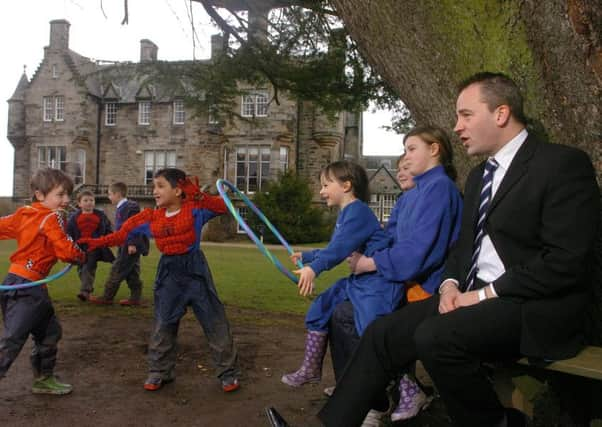Scots private school headteacher '˜betrayed' by SNP rates hike


Rod Grant, headteacher at the fee-paying Clifton Hall School outside Edinburgh, said plans to end business rates relief for institutions like his would “wreck” Scottish education by placing a huge financial burden on the state sector.
Grant’s remarks came as the backlash against the controversial plans outlined in last week’s Scottish budget mounted. Headteachers warned they would force up school fees, reduce the number of children from low-income families being privately educated and even lead to the closure of schools.
Advertisement
Hide AdAdvertisement
Hide AdIn an article posted on the Clifton Hall Facebook page, Grant argued that the policy had been driven by a “narrow-minded” desire to “kick” private schools.


Last week Finance Secretary Derek Mackay produced a budget that will end the arrangement whereby private schools are exempted from paying 80 per cent of their business rates.
The policy is estimated to raise £5m, but its opponents have argued it will drive up school fees, cut bursaries and force many families to pull children out of private schools.
Grant estimated that the consequence of more children having to be educated by the state would be £10.8m bill for the taxpayer.
Advertisement
Hide AdAdvertisement
Hide Ad“The anticipated effect of this policy will be that around 1,800 return, almost overnight, to state-funded education,” Grant wrote.


“State education costs the government £6,000 per pupil. On that basis the implementation of this policy will cost the country £10.8m whilst the rates increase will bring in £5m.
“So let’s be really clear, this is an attack on independent schools. It will not increase revenue, it will reduce it. It will not improve education it will continue to wreck it. It will not decrease social inequality, it will strengthen the dogma of elitism.”
Grant said it was wrong to characterise independent schools as elitist, arguing that one quarter of his pupils receive financial assistance, which meant children from all economic backgrounds were at Clifton Hall.
Advertisement
Hide AdAdvertisement
Hide Ad“I’m really saddened that at a time when schools like mine are doing everything they can to be community-spirited, less elite and, in particular, absolutely devoted to ensuring children from the poorest of backgrounds can attend, government seeks to add a tax burden on a tiny group of charitable institutions in complete contradiction to its stated aim of reducing inequity in society. This must, therefore, be a political decision as it certainly isn’t a financial one, which is really narrow-minded.”
Grant warned that the business rates hike would force private schools to close ranks and stop sharing expertise and facilities with state schools and the community.
He said: “I am now utterly despondent that I put my cross against SNP at the last election as this now appears to be a government that has rapidly changed from a socially democratic and ethical party into a body that is infatuated with control, dislikes dissent and is fixated on every element of society toeing the line.
“Unfortunately, this latest political decision directly affects children, Scotland’s children. The policy is being introduced not to avoid elitism, not to increase revenue, not out of some philosophical deeply held belief in us all being Jock Tamson’s bairns, but rather to kick ‘private’ education because it doesn’t fit with the government’s notion of educational equality.”
Advertisement
Hide AdAdvertisement
Hide AdGrant’s claim that there would be an increased burden on the state sector was echoed by Cameron Wyllie, the principal of George Heriot’s in Edinburgh, who suggested the future of smaller private schools would be on the line.
“Obviously, we at Heriot’s are very disappointed that the Scottish Government has come to this decision.” said Wyllie.
“We do not believe, in essence, that the move will bring in any revenue, when it is balanced against the increased costs to the education budget in Scotland which will accrue from pupils leaving independent schools because a) their parents cannot afford the increased fees or b) schools find themselves having to reduce bursarial aid in order to find the money or c) because schools close.”
John Edward of the Scottish Council of Independent Schools (SCIS), which represents more than 70 institutions, said: “It would only take three per cent of our pupils, which is nothing, to go back to the state sector for the £5m to be wiped out altogether. This is at a time when they are being told to build over 500 new classrooms by 2020 just to accommodate the rise in secondary pupils. If the numbers don’t add up, which they don’t, it suggests it wasn’t a financial argument. If it is not a financial argument then at least have the decency to say so.”
Advertisement
Hide AdAdvertisement
Hide AdWyllie said it was a “crumb of comfort” that the Scottish Government had said it would exempt independent special schools from the business rates hike.
However, Edward said it was still unclear how schools for children with additional needs would be separated from mainstream private schools in the legislation. He also suggested that many children who needed learning support were educated in the larger mainstream private schools.
The rates change was originally proposed in the Barclay Review, an exercise commissioned by the Scottish Government to examine business rates and carried out by former RBS head of Scottish operations Ken Barclay.
The review, published in September, also said the arm’s length bodies running leisure and cultural facilities for councils (ALEOs) and universities should pay the full amount. The Scottish Government decided against ending business rates relief for ALEOs and universities.
Advertisement
Hide AdAdvertisement
Hide AdA Scottish Government spokesman said: “As per the recommendations of the Barclay report, we propose to retain relief eligibility for special schools, but are giving further consideration to how we ensure that independent schools with exceptional circumstances – such as specialist music schools – continue to be eligible.
“We will continue to engage with the sector as we finalise the detail of our proposals, subject to which we intend to bring forward primary legislation to deliver this change by 2020 – as this is a change to non-domestic rating provision, rather than to charity law.
“This notice will allow time for those schools affected to plan ahead.”